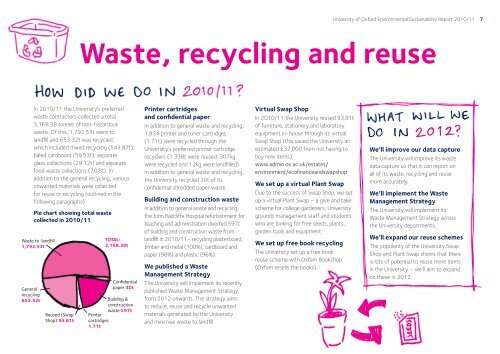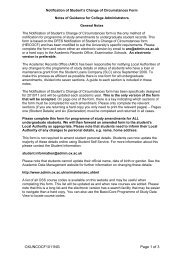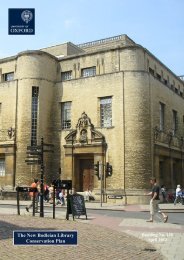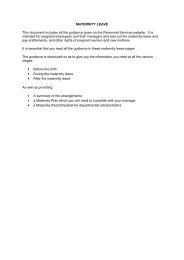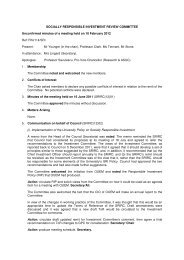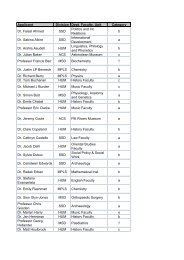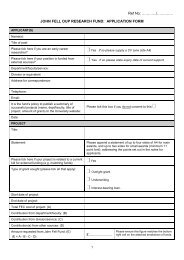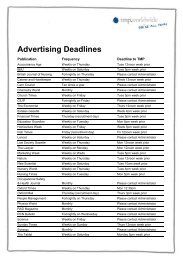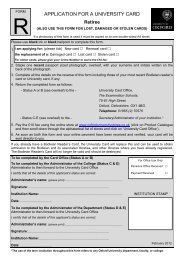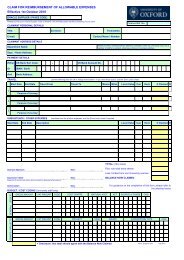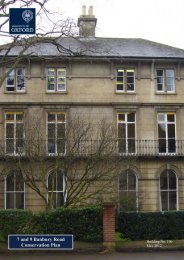Environmental Sustainability Report - University of Oxford
Environmental Sustainability Report - University of Oxford
Environmental Sustainability Report - University of Oxford
Create successful ePaper yourself
Turn your PDF publications into a flip-book with our unique Google optimized e-Paper software.
<strong>University</strong> <strong>of</strong> <strong>Oxford</strong> <strong>Environmental</strong> <strong>Sustainability</strong> <strong>Report</strong> 2010/117Waste, recycling and reuseIn 2010/11 the <strong>University</strong>’s preferredwaste contractors collected a total3,168.38 tonnes <strong>of</strong> non-hazardouswaste. Of this, 1,792.53t went tolandfill and 653.32t was recycled,which included mixed recycling (543.87t);baled cardboard (59.53t); separateglass collections (29.12t) and separatefood waste collections (20.8t). Inaddition to the general recycling, variousunwanted materials were collectedfor reuse or recycling (outlined in thefollowing paragraphs).Pie chart showing total wastecollected in 2010/11Waste to landfill1,792.53tGeneralrecycling653.32tReused (SwapShop) 93.81tTOTAL:3,168.38tConfidentialpaper 30tBuilding &constructionwaste 597tPrintercartridges1.71tPrinter cartridgesand confidential paperIn addition to general waste and recycling,1,834 printer and toner cartridges(1.71t) were recycled through the<strong>University</strong>’s preferred printer cartridgerecyclers (1.398t were reused; 307kgwere recycled and 12kg were landfilled).In addition to general waste and recycling,the <strong>University</strong> recycled 30t <strong>of</strong> itsconfidential shredded paper waste.Building and construction wasteIn addition to general waste and recycling,the John Radcliffe Hospital refurbishment forteaching and administration diverted 597t<strong>of</strong> building and construction waste fromlandfill in 2010/11– recycling plasterboard,timber and metal (100%); cardboard andpaper (98%) and plastic (96%).We published a WasteManagement StrategyThe <strong>University</strong> will implement its recentlypublished Waste Management Strategyfrom 2012 onwards. The strategy aimsto reduce, reuse and recycle unwantedmaterials generated by the <strong>University</strong>and minimise waste to landfill.Virtual Swap ShopIn 2010/11 the <strong>University</strong> reused 93.81t<strong>of</strong> furniture, stationery and laboratoryequipment in-house through its virtualSwap Shop (this saved the <strong>University</strong> anestimated £37,000 from not having tobuy new items).www.admin.ox.ac.uk/estates/environment/ec<strong>of</strong>inanceandswapshopWe set up a virtual Plant SwapDue to the success <strong>of</strong> Swap Shop, we setup a virtual Plant Swap – a give and takescheme for college gardeners, <strong>University</strong>grounds management staff and studentswho are looking for free seeds, plants,garden tools and equipment.We set up free book recyclingThe <strong>University</strong> set up a free bookreuse scheme with Oxfam Bookshop(Oxfam resells the books).We’ll improve our data captureThe <strong>University</strong> will improve its wastedata capture so that it can report onall <strong>of</strong> its waste, recycling and reusemore accurately.We’ll implement the WasteManagement StrategyThe <strong>University</strong> will implement itsWaste Management Strategy acrossthe <strong>University</strong> departments.We’ll expand our reuse schemesThe popularity <strong>of</strong> the <strong>University</strong> SwapShop and Plant Swap shows that thereis lots <strong>of</strong> potential to reuse more itemsin the <strong>University</strong> – we’ll aim to expandon these in 2012.


